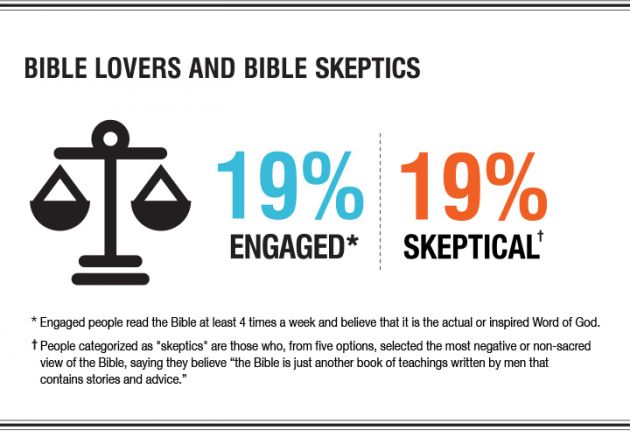Despite growing skepticism, Bible remains most popular sacred book in US

When asked to name the books that come to mind when they consider sacred literature or holy books, Americans overwhelmingly name the Bible and it is making its way onto the big screen.
This is the finding of the Barna Group study for the America Bible Society on The State of the Bible 2014 which found that 79 percent mentioned the holy book for Christians.
"The Bible has been making its way onto box office screens and home TV screens over the past year: from Noah to Son of God, people have been watching the Bible. But are they still reading the Bible? And do they still believe in the Bible?" says the Barna survey.
The survey released on Tuesday finds this year that skepticism toward the Bible is continuing to rise.

For the first time since tracking began, Bible skepticism is tied with Bible engagement. The survey also found that there are just as many Americans antagonistic to the Bible as there are engaged with the Bible.
According to the fourth annual State of the Bible survey, 19 percent said that they were antagonistic to the Bible. This number is up from 11 percent in 2011.
Compared to 2013, those who mention the Bible as sacred has remained statistically unchanged, the survey released Wednesday found.
While the difference from 2013to 2014 is not statistically significant, it does continue the decline of the Bible's mention since 2011 (86 percent in 2011 to 79 percent in 2014).
This trend is even stronger among the Millennial generation (who range in age from 18-29). According to the State of the Bible report, Millennials are less likely to view the Bible as sacred literature (64 percent in comparison to 79 percent of adults),
They are also less likely to believe the Bible contains everything a person needs to know to lead a meaningful life (35 percent in comparison to 50 percent of adults).
In addition Millennial are more likely to never read the Bible (39 percent compared in comparison to 26 percent of adults).
Boomers (ages 49 to 67) and Elders (ages 68 plus) are more likely to regard the Bible as sacred. On the other hand millennials (18 to 29) are the least likely generational segment to regard the Bible as sacred literature.
Additionally, millennials (18-29) are more likely than average to say they do not consider any book sacred or holy (19 percent) or are unable to name a book that is sacred or holy (10 percent).